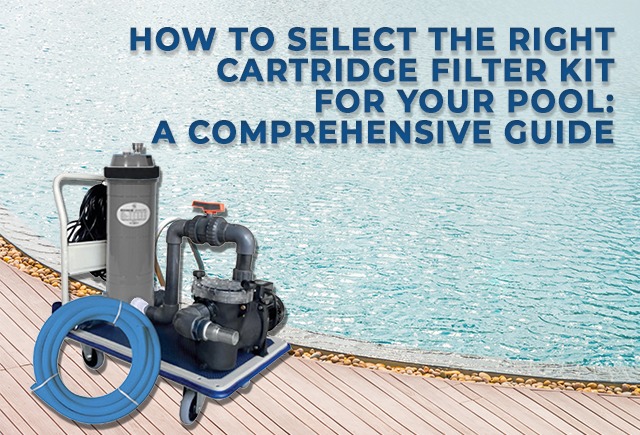
Owning a swimming pool is a rewarding experience—nothing beats the refreshing dip on a hot day or the joy of poolside gatherings. But the joy comes with responsibilities, and one of the most crucial is maintaining clean and safe pool water. A reliable filtration system is key to achieving this, and among the various options available, cartridge filter kits are widely favored for their simplicity, efficiency, and ease of maintenance.
In this detailed guide, we’ll explore how to select the right cartridge filter kit for your pool, what factors to consider, and why it matters. Whether you're a first-time pool owner or looking to upgrade your existing system, this article will provide all the insights you need.
A cartridge filter kit is a type of swimming pool filtration system that uses a pleated polyester filter cartridge to trap dirt, debris, and contaminants from the pool water. These filters are housed within a canister and are known for their low maintenance, energy efficiency, and superior filtration performance, especially for residential pools.
A typical cartridge filter kit includes:
Filter housing or tank
One or more filter cartridges
Pressure gauge
Air relief valve
Inlet/outlet plumbing connections
Before diving into the selection process, it's important to understand why many pool owners choose cartridge filters over alternatives like sand or DE (diatomaceous earth) filters.
Advantages of Cartridge Filters:
Finer Filtration: Can capture particles as small as 10-15 microns.
Water-Saving: No backwashing needed, which conserves water.
Easy Maintenance: Just rinse with a hose when dirty.
Compact Design: Takes up less space than other systems.
Cost-Effective in the Long Run: Lower operational costs due to energy efficiency and less water waste.
Your pool’s volume (in gallons or liters) is the first and most critical factor. A filter that’s too small will struggle to keep the water clean, while an oversized one may lead to unnecessary upfront costs.
Tip: A good rule of thumb is that your filter should be able to clean all the water in your pool in about 8 hours.
Measured in gallons per minute (GPM), the flow rate determines how quickly the water passes through the filter. The filter’s maximum flow rate should match your pool pump’s output.
Check: Your pump and filter need to be compatible. A mismatch can cause pressure problems or reduce filter efficiency.
The larger the surface area of the cartridge, the more debris it can hold and the longer it can go between cleanings. Surface area is usually expressed in square feet.
Small pools (under 10,000 gallons): 50–75 sq. ft.
Medium pools (10,000–20,000 gallons): 100–150 sq. ft.
Large pools (over 20,000 gallons): 200 sq. ft. and above
The filter’s performance and lifespan depend heavily on the quality of the cartridge material. Look for:
Reinforced polyester for durability and efficient filtration
Pleated designs to maximize surface area
Strong end caps and core structures for long-lasting performance
Opt for a design that allows tool-free access to the cartridge, has clear instructions, and is easy to clean. Some filters come with indicators that show when cleaning is needed.
Choose a reputable brand with good customer reviews and a solid warranty. Brands that specialize in pool filtration, such as Medley Pool, provide better support and quality assurance. Medley Pool is a trusted name in the swimming pool industry, known for its strong brand reputation and commitment to quality. With consistently positive customer reviews, Medley Pool stands out for its reliability and superior product performance, especially in pool filtration systems.
7. Budget and Long-Term Costs
While initial cost is important, also consider:
Replacement cartridge costs
Maintenance time
Water and energy savings
Installation Tips for Cartridge Filter Kits
Location: Install the filter close to the pump and accessible for maintenance.
Plumbing: Ensure all connections are tight and leak-free.
Orientation: Make sure the pressure gauge and air relief valve are visible and usable.
Start-up: After installation, monitor pressure gauge readings to establish a baseline.
How Often Should You Clean or Replace the Cartridge?
Cleaning: Every 4–6 weeks (depending on pool use and debris level)
Replacement: Every 1–2 years (check manufacturer’s recommendation and inspect for wear)
Pro Tip: Keep a spare cartridge on hand so you can rotate them and minimize downtime.
Made with durable ABS materials
High dirt-holding capacity and corrosion-resistant
Ideal for both residential and commercial pools
Choosing the right cartridge filter kit is not just about buying a component—it’s about investing in clean water, safe swimming, and peace of mind. Evaluate your pool’s size, your lifestyle, and your maintenance preferences to find a filter that works for you. A good filtration system makes pool ownership easier and more enjoyable. So take your time, do your research, and make a decision that will keep your water sparkling clear for years to come.
2023-2025 Medley All Rights Reserved